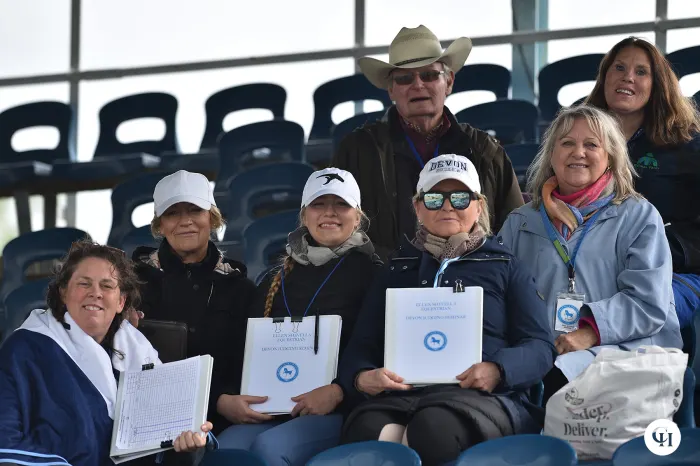Ellen Shevella knew she loved to judge horses from the time she was a pony rider competing at shows like the Sussex County Farm And Horse Show (New Jersey).
“At 10 years old I remember sitting in the boxes at that horse show while all my little friends ran around the fair, and I wanted to watch the horse show,” said Shevella, who went to the state finals with her 4-H judging team. “I started developing my eye at 10 years old, and I could tell what a really good mover was and what a good jumper was.”
So in a lot of ways it’s no surprise that she got her judge’s card at the relatively tender age of 27, earning her 40-year U.S. Equestrian Federation judges’ pin four years ago. Shevella holds her ‘R’ card in hunters, hunter/jumper seat equitation, jumpers and hunter breeding.
Shevella, 71, attributes some of her interest in hunters to her background as an artist. She studied painting at Philadelphia College of Art (later known as University of the Arts), and she sees a similarity between visual art and appreciating the symmetry, shape and balance of a show hunter.
“I think artists have powers of observation that sometimes translate to the judging,” she said. “I always tell people: If you’re going to judge, you need to be very tuned into detail.
“You’re always looking for the best horse, in terms of the hunters, the best jumper, the best mover, the horse that has beautiful manners and looks through the bridle beautifully and is soft across the ground,” she added. “They’re few and far between.”
ADVERTISEMENT
Shevella is passionate about sharing her four decades of judging experience with others. While she finds it difficult to accept apprentice judges (“I feel my judging suffers from it because I’m trying to help them so much and talk with them,” she said), she’s found a niche in holding independent judging seminars several times a year.
“I said, maybe there’s a need for people that don’t necessarily want to get a card, or they just want to judge local shows, to do something to help them [learn about judging],” she said. “And of course, I love going to Devon, so I thought, maybe I can do it there.”

She called David Distler, who co-managed the show at the time, and made a pitch: If she came on a weekday, when the show was quieter and the stands weren’t packed, could she host a dozen or so hunter enthusiasts in a live judging seminar? Distler agreed, and that was 10 years ago. Since then she expanded to holding seminars at the Pennsylvania National and at the World Equestrian Center-Ocala (Florida). The first year she had six people, and last year she had 15 participants in each session of the ESEQ Devon Judging Seminar Edu-Vacation. The clinics have become so popular that they’ve attracted a sponsor, Equine Insurance Professionals LLC.
In a lot of ways, Devon is the perfect show for a seminar. The best horses in the country are there to go head-to-head, and there’s room for Shevella and her eight to 15 participants to sit under a covered area with a good view of the ring—away from the in-gate and the judges, so they can have a little privacy to speak freely about the rounds. The Devon schedule allows her to host two seminars at Devon, one equitation session and one for hunters. On junior weekend, the seminar meets from 7:30 a.m. to around 1 p.m. Thursday and Friday to watch equitation, and during senior week they evaluate the professional hunters on Monday and Tuesday. Two of the equitation classes and all of the hunter classes at Devon are scored, so attendees have immediate feedback on how their choices compare to the judges’.
“I get everybody at these clinics,” said Shevella, Charlottesville, Virginia. “I get current judges to aspiring judges to trainers to IHSA and IEA coaches to my main group, amateurs. I get pony moms; I even had a pony dad.”
Shevella splits the group into two, with more experienced folks on one side of her and the less experienced ones on the other, with a three-ring binder and lots of score sheets. Some participants never pick up a pen and just want to discuss the rounds. Some keep meticulous notes, and some just use the seminar as an excuse to go to Devon, Shevella said.
ADVERTISEMENT
“They can be as involved and serious about it or not,” she said. “They can go shop and hang for part of it, or, the more serious ones can sit closer to me, and those on the edges can come and go as they please. Sometimes it’s the people I think aren’t getting much out of it that come back again and again.”
In the past Shevella has recommended former participants to take on local judging jobs she couldn’t do. She doesn’t advertise her seminars anywhere besides her personal Facebook page, and she emphasized that the seminars are not affiliated with the USEF or the U.S. Hunter Jumper Association.
Shevella reviews the rules of the class along with how to set up one’s judge’s card, conscientious of the fact that most judging mistakes are bookkeeping errors. Occasionally for the equitation she’ll have a special guest, like Andre Dignelli, Archie Cox or Stacia Madden who will chat with participants about the course before the class and occasionally walk the course with them.
“It’s not just for judges, it’s for everyone,” said Shevella. “We have people that have been coming to the seminars for years and are friends. They go other places together and end up judging shows for each other like a little club. I call them my alumni.
“It’s really become a networking group as well,” she continued. “They sell horses to each other. One of my favorite parts of it is creating friendships among the people.”














